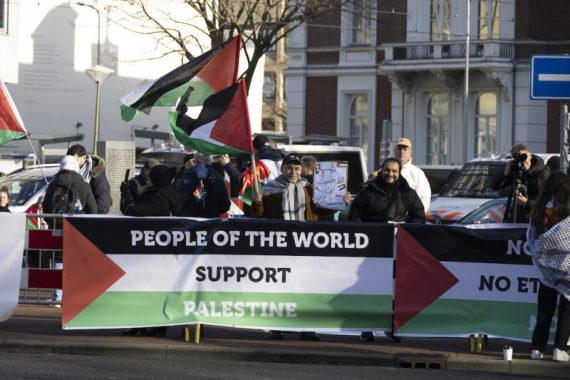W
hen the Herero and Nama tribes revolted against German colonialists and killed 120 Germans on January 12, 1904, the German colonial administration ruling the region now known as Namibia began a massacre that would last four years and culminate in the murder of 70,000 people. Known as the first genocide of the 20th century, the figures show that for every German killed, the troops of the then German Empire killed 583 people.
The Germans then launched World War I, which resulted in the deaths of approximately 18 million people. Germany’s ambition to turn the world into a battlefield rekindled in the late 1930s, and then Chancellor Hitler declared war—which was to turn into World War II—on almost the entire world. Driven by nationalistic sentiments, the war ended with the death of 52 million people, including millions of Jews. Understanding that the Germans would not let the world live in peace, the world powers occupied Germany at the end of the war; today, Germany forms its foreign policy based on this legacy.
Since the end of World War II, German politicians have painted a peaceful picture of their country. They constantly emphasize their commitment to international law, human rights, the rule of law, democracy, and other cherished values. In order to show that they have no imperial designs and to avoid any misunderstanding, they even hesitated to lead the European Union. This policy actually worked, convincing foreigners that, as a state, Germany stood for peace and economic development.
However, as soon as Israel launched its latest attack on Gaza, the German government openly supported Tel Aviv’s genocidal plans and showed its true face. Almost all officials in Berlin—and the German head of the EU Commission, Ursula von der Leyen—constantly state that Israel has the right to defend itself. Their unwavering support is so explicit that they even avoid expressing concern for the lives of civilians. Israel’s massacre continues and the death toll has exceeded 25,000, but Germany does not even call for a ceasefire. It also intervened in favor of Israel in the International Court of Justice (ICJ) case brought by South Africa regarding Israel’s genocidal attacks in Gaza.
There is a special relationship between Germany and Israel that is said to be based on shared Western values, beliefs, and certain historical events. According to official German statements, the Germans, as the children of the perpetrators of the Jewish Holocaust, acknowledge the guilt of their ancestors and give assurances that they will prevent any possible massacre of Jews. It is good to see Germany admitting its wrongdoing, but, strangely, its response to past mistakes is another mistake.
Germany’s pro-Israel stance shows that it is once again on the wrong side of history. The best reminder of its current wrongdoing has come from one of Germany’s victims: Namibia. The President of Namibia Hage Geingob stated on X that his country rejects Germany’s support for the racist Israeli state’s genocidal intent against innocent civilians in Gaza. Recalling Germany’s genocide in Namibia in 1904-1908, Geingob advised the German government to atone for the said genocide first.
In other words, he told the German government to look at its own history before defending Israel. The Namibian president also emphasized the mistake and brutality of supporting Israel’s genocide at the ICJ. Geingob warned that Germany cannot, on the one hand, express its commitment to the United Nations Convention on the Prevention and Punishment of the Crime of Genocide and, on the other, support an ongoing genocide while claiming to stand on moral high ground.
The Namibian president’s statement is unique not just because of its support for Palestine and calling out Israel for the genocide It is perpetuating, but also for questioning Germany’s and the Western world’s true commitment to moral values.. There is a clash of civilizations over the Gaza genocide with the developed West on one side and developing and impoverished Africa on the other. There is a clash between power and poverty.
While colonized Namibia opposes Israel’s mass murder of civilians and illegal colonization in general, Germany does not seem to have learned any lessons from its past. Germany’s logic of defending Israel is completely irrational: Germany thinks (or pretends to think) that it can salve its conscience by supporting a genocide perpetrated by the grandchildren of Nazi victims.
Humanity, though, demands that a new massacre be prevented, regardless of who is perpetrating it. Moreover, allowing one community to victimize another is contrary to moral values. From a legal perspective, a state cannot defend actions (in this case, by Israel) that are considered occupation and genocide under international law. If Berlin claims to abide by international law, it cannot support Israel.
However, despite the undeniable facts, the Germans prefer genocide to the values they claim to uphold. This shows that Germany’s and, on the whole, the Western world’s disrespect towards the South, the East, the Muslim world, or the whole non-Western world in general, continues. Values are only words for them and they preserve them only as such.
Recommended
Namibia stands on the right side of history
Namibia, on the other hand, stands on the right side of history and strives to bring Israel to justice for its crimes. The African country is far more underdeveloped than even Gaza and needs foreign aid to keep up with the rest of the world. Rich countries can reward Namibia with lucrative aid if it sides with Israel, but it has preferred to stand with the oppressed.
We can now ask: who is more civilized? From a materialistic perspective, those with advanced economies and well-run political systems can be considered civilized. However, human beings are not machines. They have feelings and moral values that distinguish them from animals. When a person does not consider morality and justice in their actions, their humanity is diminished and they become a threat to society.
Time has shown that improvements in human life have not improved human beings in the same way. A good education and better living standards do not always make a person more decent, honest, moral, and merciful. History shows us that developed countries like Germany have killed more people in the 20th and 21st centuries than the rest of the world combined.
In contrast to the developed world, poor countries act more rationally, do not condone oppression, and are now taking steps to end it. In other words, poverty is superior to power: Namibia’s and Germany’s stances against Israel’s crimes clearly show that Africans are more civilized when it comes to humanity. It seems that those who are advancing in technology have sacrificed their values and are currently without sense or logic to guide them towards morality.
Germany might produce excellent cars, but has lost the goodness in its heart; Namibia does not provide the world with cutting-edge technology, but remains good at heart. The ongoing Gaza genocide has revealed that while German civilization is fighting to defend genocide, Namibian civilization is fighting to prevent it.





